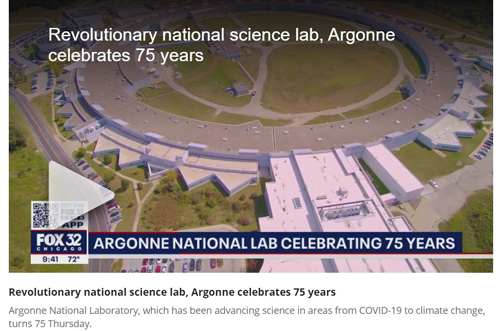
From Fox 32 News Chicago: Happy Birthday to a local lab that has been helping solve the world's problems for decades!
Argonne National Laboratory is turning 75.
Technology at the Lemont lab helps scientists at Argonne National Laboratory see tiny things to make huge discoveries.
"The smaller the thing that you look at, the bigger the facility, so the APS is huge. You can fit Wrigley Field in the center of our electronic storage ring," said Stephen Streiffer, the Deputy Laboratory Director for Science and Technology.
APS stands for "Advanced Photon Source." It's a big circle at this lab that creates ultra-bright, high energy X-ray beams.
Dr. Streiffer says they have used its power to make safer jet engines and create vaccines for the coronavirus.
Argonne opened in 1946 with the mission of finding peaceful uses for nuclear energy.
Seventy-five years later, this Department of Energy site keeps researching the world's biggest problems.
A big focus now is climate change, and they're working on the next generation of batteries to help.
See the entire Fox 32 News story here.
The Advanced Photon Source is a U.S. DOE Office of Science User Facility operated for the DOE Office of Science by Argonne National Laboratory under Contract No. DE-AC02-06CH11357.
The U.S. Department of Energy's APS is one of the world’s most productive x-ray light source facilities. Each year, the APS provides high-brightness x-ray beams to a diverse community of more than 5,000 researchers in materials science, chemistry, condensed matter physics, the life and environmental sciences, and applied research. Researchers using the APS produce over 2,000 publications each year detailing impactful discoveries, and solve more vital biological protein structures than users of any other x-ray light source research facility. APS x-rays are ideally suited for explorations of materials and biological structures; elemental distribution; chemical, magnetic, electronic states; and a wide range of technologically important engineering systems from batteries to fuel injector sprays, all of which are the foundations of our nation’s economic, technological, and physical well-being.
The U.S. Department of Energy's Office of Science is the single largest supporter of basic research in the physical sciences in the United States and is working to address some of the most pressing challenges of our time. For more information, visit the Office of Science website.
